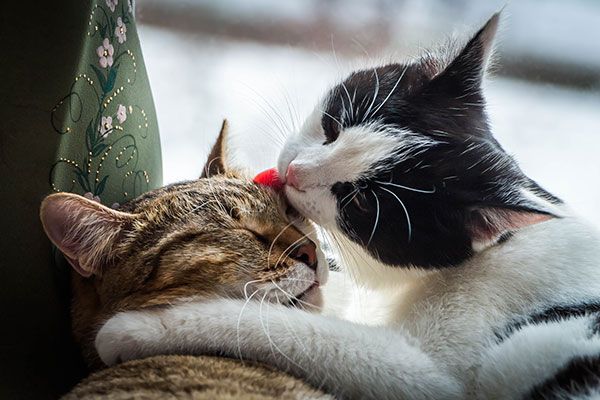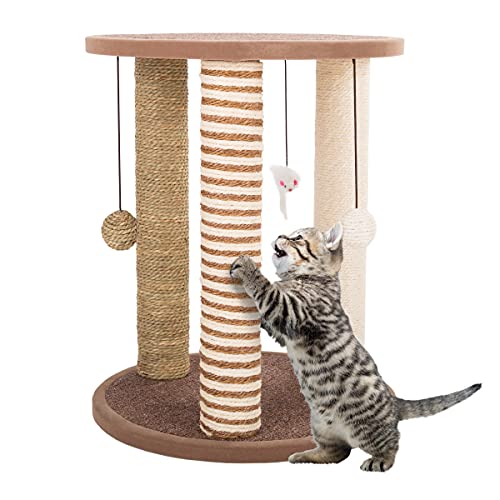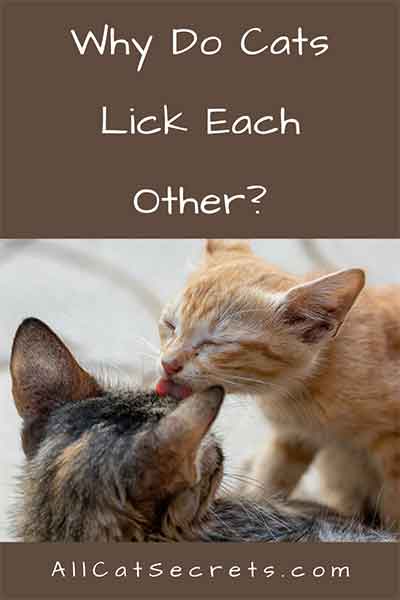It doesn’t matter if you’ve recently adopted cats or have lived with these animals virtually your entire life. You must have observed your cute, furry companions licking themselves frantically every so often.
Licking is a common feline behavior that’s almost impossible to miss. That’s mainly due to its frequency and intensity.
Even so, it’s natural to want to learn more about licking and why this habit is so common among our feline friends. And that takes us back to the question, why do cats lick each other?
Cats mainly lick one another as a means of grooming themselves. Licking is an instinctive expression of feline affection.
Note that cats sleep about two-thirds of their day. They then spend the bulk of their waking hours playing, prowling, and grooming. In addition to grooming their own bodies, cats also tend to groom one another. This behavior is known as allogrooming and refers to the phenomenon where animals from the same species groom each other.
Humans are a classic case of allogrooming. Besides humans, there’s a host of other animals that demonstrate allogrooming tendencies.
Examples include primates, birds, and animals in the cat family. The grooming style varies by species. For instance, primates mainly groom themselves using their teeth and forelimbs, while birds groom themselves by pecking one another.
However, it’s also worth pointing out that cats do not only lick each other as a means of grooming themselves. While licking is primarily a show of affection, it could also be a demonstration of sheer dominance.
Read on as we unravel all the possible reasons cats lick one another and what you can do if the behavior seems a bit out of whack.
Table of Contents
Why Do Cats Lick Themselves?
Before we delve deeper into the reasons cats lick each other, we should probably begin easy by understanding why these animals lick themselves.
Cats are notoriously known for their heightened sense of hygiene. As we already indicated, these animals spend two-thirds of their time sleeping. The remaining one-third is dedicated to playing, prowling, and licking (plus other essential activities in between, such as eating, drinking, pooping, and peeing).
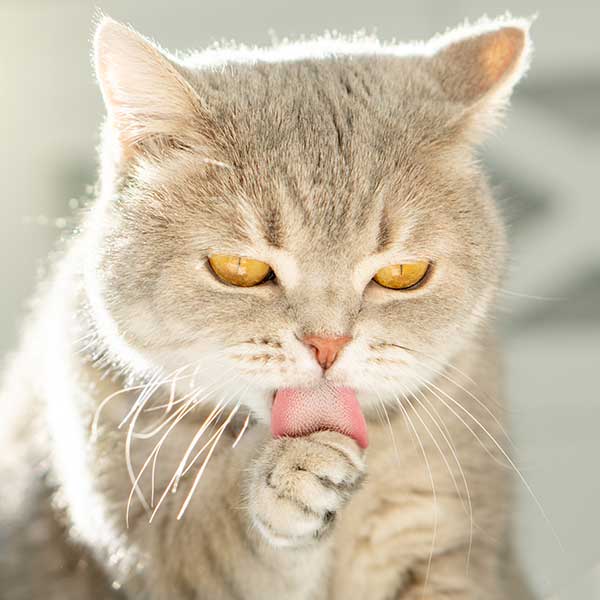
If you observe your cat keenly, you’ll realize that the animal spends the bulk of his waking hours licking himself. And that might get you wondering, why do cats lick themselves?
Well, there are numerous reasons cats lick themselves. The most common one is that licking is the primary way cats groom themselves.
Licking (read grooming) comes naturally to most cats. Your feline friend can start to lick his body even without any apparent indication of dirt. However, grooming among cats tends to be more intense after meals or following periods of intense physical activity. It’s the cat’s way of cleaning himself of dirt, grime, or food particles that might be dislodged in his fur.
‘But just how effective is licking as a grooming technique,’ you may ask?
Well, a cat’s tongue contains barbed, spiny structures known as papillae. The papillae act as tiny hooks and can get deeper into a cat’s fur to help clean out any accumulated dirt.
Besides grooming, a cat can also lick himself as a way of temperature regulation.
Note that cats, unlike humans, have no sweat glands spread all over their skin. Instead, they excrete a relatively smaller amount of sweat through glands located in their paw pads.
But since the surface area is rather small, cats have evolved other in-built mechanisms of maintaining their internal body temperature. One such method is by licking themselves.
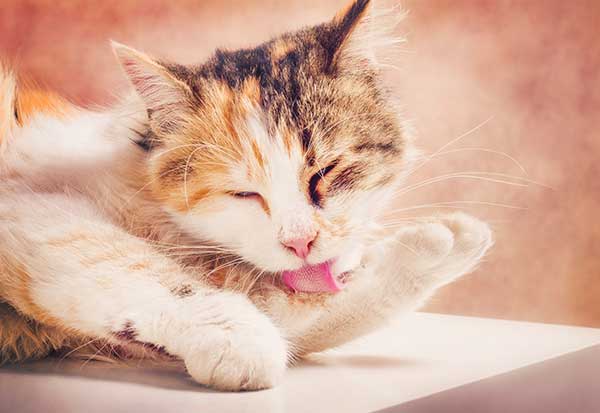
Scent masking is another common reason cats lick themselves.
Cats are stealthy creatures who prefer to keep their identities under wraps. That explains why, even while hunting, cats will usually stalk their prey downwind. It’s an ingenious scent-marking technique that almost always works in the cat’s favor.
The same logic applies to licking. A cat may lick himself as a way of masking his scent from potential predators. Even if there are no predators around, your feline friend will still lick his scent off his body to avoid getting detected by other cats and animals in the neighborhood.
The following are other reasons cats lick themselves;
- Fur and skin lubrication
- Pleasure stimulation
- Stress relief and mental relaxation
- Removal of dirt and germs from injuries
- An obsessive-compulsive disorder
Why Do Cats Lick Each Other? It’s Mainly a Case of Allogrooming
We’ve already gone through a number of reasons cats lick themselves. But if you’re a proud owner of multiple cats, you’ll realize that not only do the animals lick their own bodies. They also lick each other from time to time. And by all indications, they seem to enjoy doing it. This may get you wondering, why do cats lick each other?
Well, cats generally lick one other for the same reasons they lick themselves.
Grooming is unarguably the most common reason cats lick each other.
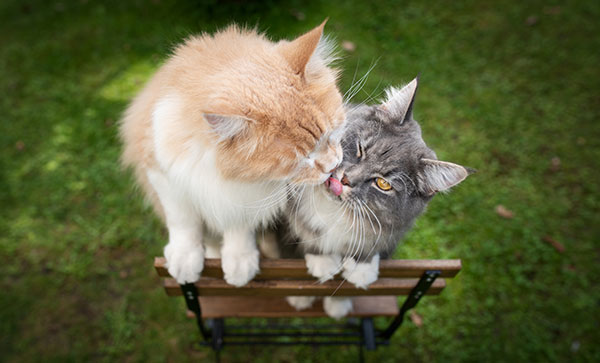
As we indicated earlier on, cats respond to a behavior known as allogrooming, which refers to grooming between members of the same species. Allogrooming is an instinctive behavior intended to enhance bonding and reinforce social hierarchies. The behavior is highly common among free-roaming cat colonies.
According to studies, allogrooming is one of the three ways cats express and reinforce cohesion within their colonies. The other two ways include allorubbing and the transmission of scent signals.
One thing that stands out here is that allogrooming happens naturally. Cats will begin to lick each other spontaneously even when there are no visible dirt markings on their bodies.
The following are other tell-tale signs that your cat is engaging in allogrooming;
1. He’s living in a family with two or more cats
Allogrooming is a social behavior. So, it can only happen when you have multiple cats in the same household.
In most cases, the phenomenon involves two pairs of cats. Also, the cats involved are usually less aggressive towards each other.
2. He actually makes a move
In almost all instances of allogrooming, one cat usually approaches or invites the other cat into the grooming session.
It’s unusual for cats already in a sitting or lying position to start grooming each other.
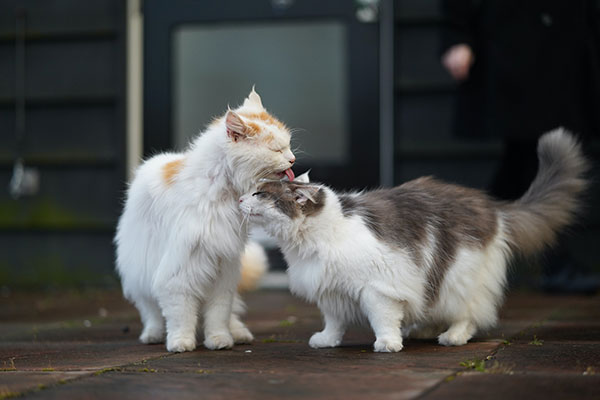
3. He’s doing more of the licking
Two cats may be involved in allogrooming. However, it’s usually one of the cats that does the majority of the licking.
4. He’s targeting the head and neck areas
Allogrooming mostly occurs in the head and neck area. This interesting revelation points to allogrooming as being more of social behavior than a routine cleaning exercise.
So, why do cats lick each other’s heads?
A common question among cat owners is, ‘why do cats lick other cats’ heads?’
Although cats can lick various areas of their bodies, much of the licking tends to be focused on each other’s heads. It’s one of the clearest indications of allogrooming.
- High protein cat food dry formula with real chicken as the first ingredient
- Natural with prebiotic fiber nourishes specific intestinal bacteria for digestive health
- Wholesome cat food dry kibble with vitamin A and Omega-6 fatty acids to nourish skin and coat
Last update on 2024-07-12 / Affiliate links / Images from Amazon Product Advertising API
5. He’s a male cat
According to studies conducted over the years, 65.1% of all the grooming sessions happened between two male cats. About 31.3% involved a male and a female, while only 3.6% involved two females. These findings were enough to infer that licking is predominantly a male cat’s domain.
But that’s not all.
Researchers also found that whenever allogrooming involved a male and female cat, the male cat initiated the grooming in 90.4% of all cases.
6. He’s the dominant cat
Studies have also established that allogrooming depends on a cat’s confidence levels as well as his position in the family hierarchy.
Dominant and confident cats tend to allogroom the less-dominant and less-confident ones.
Using the same logic, aggressive cats tend to be the ones doing much of the grooming.
7. The other cat is his sibling
Allogrooming is more common among littermates, and understandably so. While cats have incredibly flexible spines, there are still certain areas on their bodies that they cannot reach with their tongues. Examples include inside their ears and the back of their heads. The next best alternative would be to have a trusted sibling do all the grooming work in these inaccessible areas.
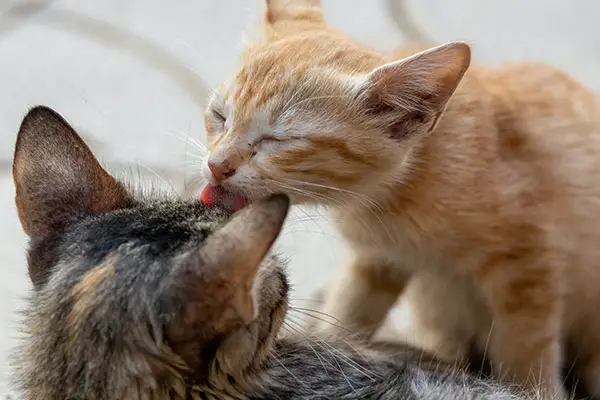
Perhaps you’ve always wondered, why do cats lick each other’s ears?
To reiterate, allogrooming is the primary reason cats lick one another’s ears. In this case, the cat that offers their ears for licking mainly does so because the ears are out of reach of their barbed tongues.
However, note that even cats who aren’t necessarily that close may still lick each other from time to time. It’s all part of their natural, inborn traits.
Indeed, you might have found yourself asking, ‘why do unrelated cats groom each other?’
As we’ve just stated, cats that aren’t necessarily bonded by blood may still lick each other. That’s because the response for grooming happens naturally.
But why do cats groom each other?
We’ve just outlined how cats respond to allogrooming. We’ve also repeatedly emphasized that allogrooming is more of a natural instinct than a planned grooming session.
That assertion might beg the question, what does it mean when two cats groom each other?
Well, the answer is more straightforward than you may have imagined. Cats groom one other to clean out dirt and food particles from each other’s fur. Grooming may also help to remove parasites and dead skin cells from their bodies. Plus, it helps to moisturize each other’s coats.
- Multi-platform cat tree with scratching posts and enclosure
- Tiered platforms provide space for your cat to relax, play, and climb
- Helps keep your cat from damaging carpets, furniture, curtains, and more
Last update on 2024-07-12 / Affiliate links / Images from Amazon Product Advertising API
The following section explores additional reasons cats lick or groom one another.
More Reasons Cats Groom Each Other
1. Social Bonding
This ties back to allogrooming.
According to numerous studies, allogrooming is common among cats that are already strongly bonded. So, two or more cats are likely to lick one another if they feel comfortable in each other’s presence.
To be 100% certain that social bonding is the reason your cats are licking each other, pay keen attention to the areas they target. Cats that are strongly bonded will usually lick each other’s face, ears, and neck.
2. Social Ranking
Cats may also lick each other to establish social hierarchies.
As we already mentioned, it’s the dominant cat that will normally initiate the licking. It’s the cat’s way of reinforcing his position within the family’s pecking order.
In addition to grooming, a dominant cat may also exhibit other aggressive behaviors while attempting to reinforce his position within the family hierarchy. For instance, the cat may assume a higher posture than the submissive one. Scientists believe that this serves as a friendlier alternative to an all-out confrontation.
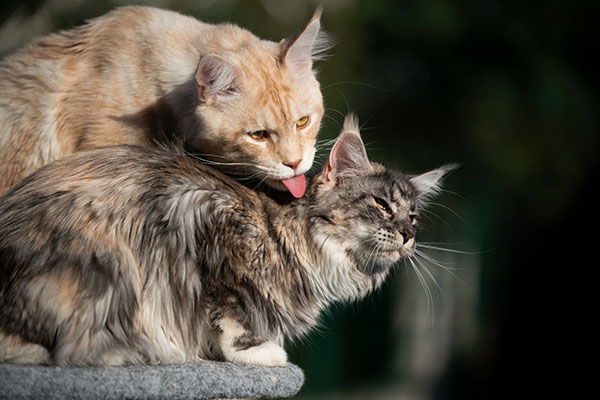
Another thing worth noting is that in rare circumstances, the submissive cat may go soliciting for grooming from his dominant counterpart.
You’ll notice the cat approaching the dominant one exposing his head or neck as a way of encouraging grooming.
3. Familial Affection
It’s not unusual to come across a cat owner wondering, do cats groom each other as a sign of affection? The answer is a resounding yes.
Cats, like humans, have developed a range of ways to express their affection for one another. Licking is one such method.
Licking is to cats what kissing is to humans. While humans exchange saliva, cats exchange body scents.
Affection-induced licking is more common among cats with blood ties. You’ll mostly observe the behavior among siblings as well as between kittens and their mothers.
4. Boredom
Boredom could also cause cats to pair up and start licking each other.
When cats have no other ways to expend their energy, they may get up to all manner of mischief in their attempts to stimulate themselves. And licking might just happen to be the next most stimulating thing to do.
- COZY CAT SCRATCHER - Ensure kittens and cats have ample room to sharpen claws without using your furniture with this cat...
- HOURS OF PLAY - Keep felines occupied while at the office or working from home with cat accessories like these scratching posts...
- STURDY DESIGN - Construction from sturdy materials help these cat accessories for indoor cats endure kitties with mischief on...
Last update on 2024-07-11 / Affiliate links / Images from Amazon Product Advertising API
5. Protection and Acceptance
Cats may lick each other as a way of reassuring themselves of protection. This phenomenon is more common among cats that are relatively new to each other.
When you bring home a new cat, the animal may find it difficult to socialize with the resident cat. To make the newcomer feel comfortable, the resident cat will approach him and groom him while adopting a protective position.
It’s a kind gesture aimed at welcoming the new cat into the family.
6. Wound Cleaning
Another frequently asked question among cat owners is, ‘why do cats lick each other’s wounds?’
Cats mainly lick each other’s wounds to help clean them.
Cat saliva contains several compounds known for their antibacterial and analgesic benefits. Examples include opiorphin, lactoferrin, and peroxidase.
These compounds offer relief from pain and discomfort, while also keeping wounds from becoming breeding grounds for bacteria.
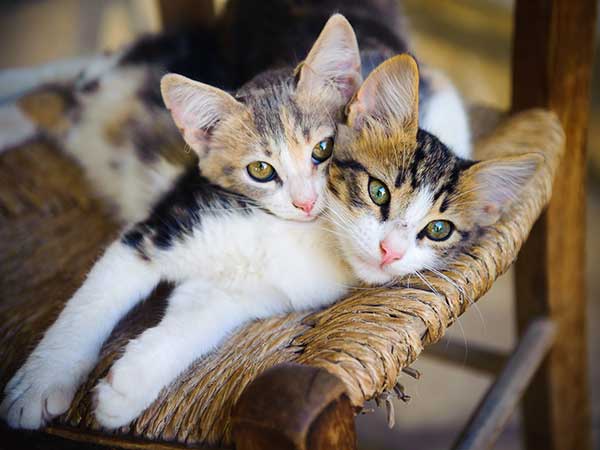
7. Maternal Instincts
As soon as a mother cat gives birth to her litter, she starts licking them. There are several reasons for this.
First, licking allows a mother cat to remove the afterbirth fluids from her kittens’ fur. Nearly all mammals do this.
Licking also helps the mother cat to scent-mark her newborn kittens as a way of identifying them. This is common in households with multiple cats, where there may be risks of a mother cat separating from her young.
In fact, cases abound where cats rejected their kittens simply because the younger cats were not licked enough. As such, they didn’t have a familiar smell.
Another reason mother cats lick their young is that it serves to soothe and comfort the kittens. By licking her young, the mother cat is simply trying to assure them of her protection.
Lastly, licking helps to keep the kittens warmer. This is necessary for preventing the newborn kittens from catching a cold.
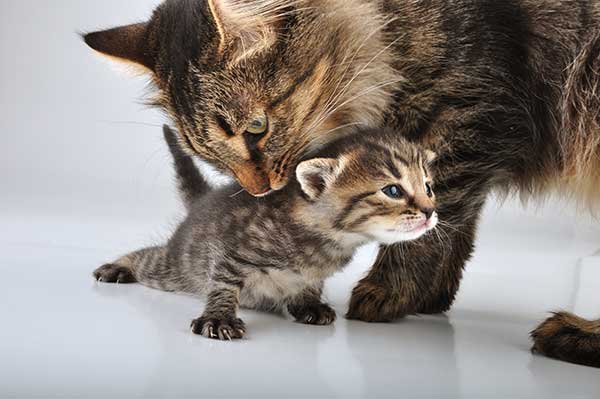
8. Sexual Arousal
Mating is not a very pleasurable experience among cats. That’s because a male cat’s penis contains barbed structures that erect when pulled out, thereby irritating the female cat’s vagina.
But while the actual intercourse is painful, foreplay isn’t. One way cats achieve sexual stimulation is by licking each other’s private parts.
If you’ve always wondered, ‘why do cats lick each other’s private areas,’ you’ve got your answer right there.
However, note that licking each other’s private parts isn’t necessarily intended for sexual arousal. Cats of the same gender may also lick each other’s private areas for other reasons, ranging from normal allogrooming to cleaning of wounds, etc.
9. Signs of a Medical Condition
In some cases, there may be an underlying medical condition causing cats to lick one other.
To establish whether there’s a medical trigger, observe the frequency and intensity of the licking. More frequent and intense grooming is suggestive of disease.
Also, try to observe the specific areas of the body where the grooming cat focuses on. Usually, this is the area with the problem.
For instance, if a cat focuses on licking another cat’s abdomen, it’s important to check for wounds on the second cat’s stomach.
Sometimes, the cat receiving the grooming might be suffering from an underlying disease manifesting in pain and inflammation. But because he has no other way to soothe the pain, he wilfully offers his body up for licking.
- A tasty & body nourishing treat for cats & dogs - Essential fatty acids for a healthy coat.
- Healthy, powerful Omega fatty acids - This premium Salmon Oil is rich with Omega-3 & Omega-6 fatty acid from EPA & DHA, that can...
- Help your pet stay looking great - The rich Omegas in Salmon Oil are a dog health supply to nourish skin and coat and keep your...
Last update on 2024-07-12 / Affiliate links / Images from Amazon Product Advertising API
What Does It Mean When A Cat Licks You?
Not only do cats lick their own bodies as well as the bodies of other cats. Many cats also have a penchant for licking their human parents. And there are various reasons for this.
First, your cat may lick you because he loves you. It’s the cat’s own way of expressing his affection for you.
Some cats also lick their owners to scent-mark them. Every lick leaves pheromones on your body. When the cat smells these pheromones later on, he’ll instantly know that you’re his ally.
Interestingly, your cat may also lick you to ‘clean you up’ because he thinks you cannot do it yourself. This is usually a natural response to allogrooming.
Lastly, licking could be a sign of boredom or attention-seeking behavior. The cat could be trying to solicit a treat from you or asking you to play with him.
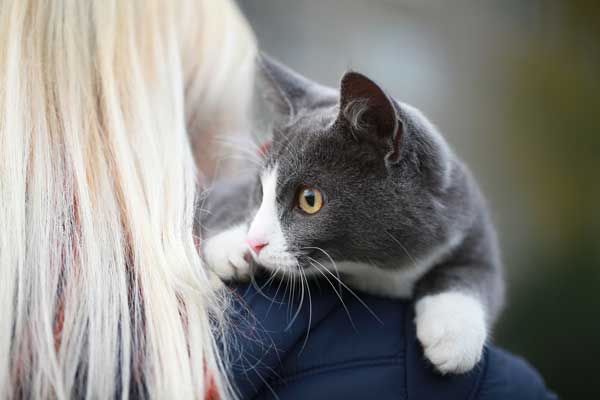
How to Curb Excessive Licking
Although we’ve already mentioned it several times throughout this post, it warrants repeating that licking is ingrained in a cat’s DNA. Usually, there’s no immediate cause for alarm.
However, it’s best to pay keener attention if you suspect that your cat is engaging in obsessive-compulsive licking. That’s because there could be an underlying medical condition, such as heart failure, kidney disease, or osteoarthritis.
In this case, it would help to schedule a visit to the vet and have both cats examined. Should the vet rule out any underlying disease, then your cat’s excessive licking could be due to other reasons like boredom.
You can help your cat overcome boredom by ensuring he gets enough physical and mental stimulation. That includes exercising the animal frequently enough, playing with him, and supplying him with enriching toys to keep him stimulated during your absence.
Lastly, if you’re bringing a new cat home, it’s important to introduce him cautiously to the resident cat. Not only will that help to prevent excessive licking by the resident cat. It will also reduce aggressive confrontations.
On the first few days, you could keep the cats in separate rooms and allow them to pick each other’s scents and sounds. Then, allow them to have a supervised physical meet-up, paying attention to any signs of aggression.
If the newcomer seems frightened, allow him to escape. Arrange for more subsequent meet-ups until you’re sure the cats can now get along.
- INTERACTIVE TOY FOR CURIOUS CATS – Cat Amazing’s Shark Tank-famous & award-winning puzzle box is designed to stimulate and...
- ENCOURAGES NATURAL INSTINCTS – Stimulate your cat's natural foraging instincts to explore, scratch, sniff and retrieve hidden...
- STRESS AND BOREDOM BUSTER – Our puzzle cat toy is sure to pique your cat’s curiosity as it works with their favorite treats,...
Last update on 2024-07-11 / Affiliate links / Images from Amazon Product Advertising API
Should you encourage your cat to lick you?
No, you shouldn’t.
Although a cat’s sandpaper-like tongue may offer comfort to other cats, the same can feel uncomfortable on the human skin.
Also, cat licks may transmit diseases. That’s especially if you let your cat lick open wounds or sensitive skin areas like your mouth and tongue.
Other Frequently Asked Questions Related To Cats and Licking
Why do cats lick each other and then fight?
During normal grooming rituals, one cat may lose patience with another and give them a bite. The other cat may bite back, after which the grooming session could turn into a full-blown fight.
Why do cats bite each other’s necks while grooming?
As we’ve just pointed out, some cats may lose patience with one another during their routine grooming sessions and end up biting each other’s necks.
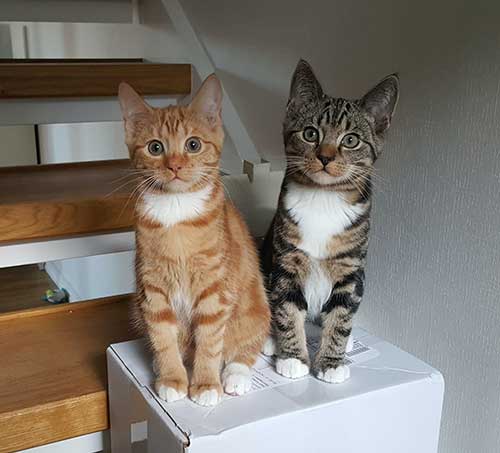
Why do cats lick each other when they greet?
Cats are social animals. Licking is their way of reinforcing social bonding and saying hello after long periods of being apart from each other.
Why does one cat lick the other cats bum?
Cats lick each other’s bums as a way of greeting or learning more about each other. Note that cats have scent glands in their butts. So, a sniff can reveal more about the other cat.
Why do male cats lick other male cats?
Male cats lick one another for the same reasons cats groom each other. Licking between male cats is more common among strongly bonded cats, such as brothers.
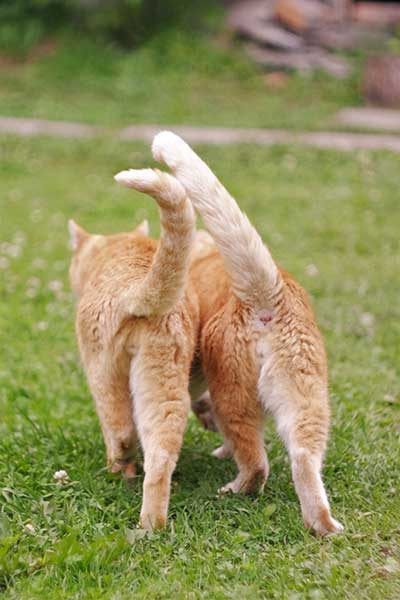
So, Why Do Cats Clean Each Other?
Cats clean each other for various reasons. However, it mostly comes down to allogrooming.
As a pet parent, it’s important to know where to draw the line between normal grooming behavior and obsessive-compulsive grooming. If you’re ever in doubt, don’t hesitate to visit the vet and have your cat examined.
Checkout Our Favorite Cat Products
1. Best Online Course For Cat Parents
Our favorite: The Cat Language Bible (How to Finally Understand And Speak to Your Cat) – A new form of cat to human communication that many cat owners have dreamed about… but few have actually thought possible.
2. Best Immune Support For Cats
Our favorite: Tomlyn Immune Support – Best Supplement for Cats and Kittens.
3. Best Cat Treats
Our favorites: LIFE ESSENTIALS All Natural Freeze Dried Chicken And Sheba Meaty Tender Sticks – Both are Great.

